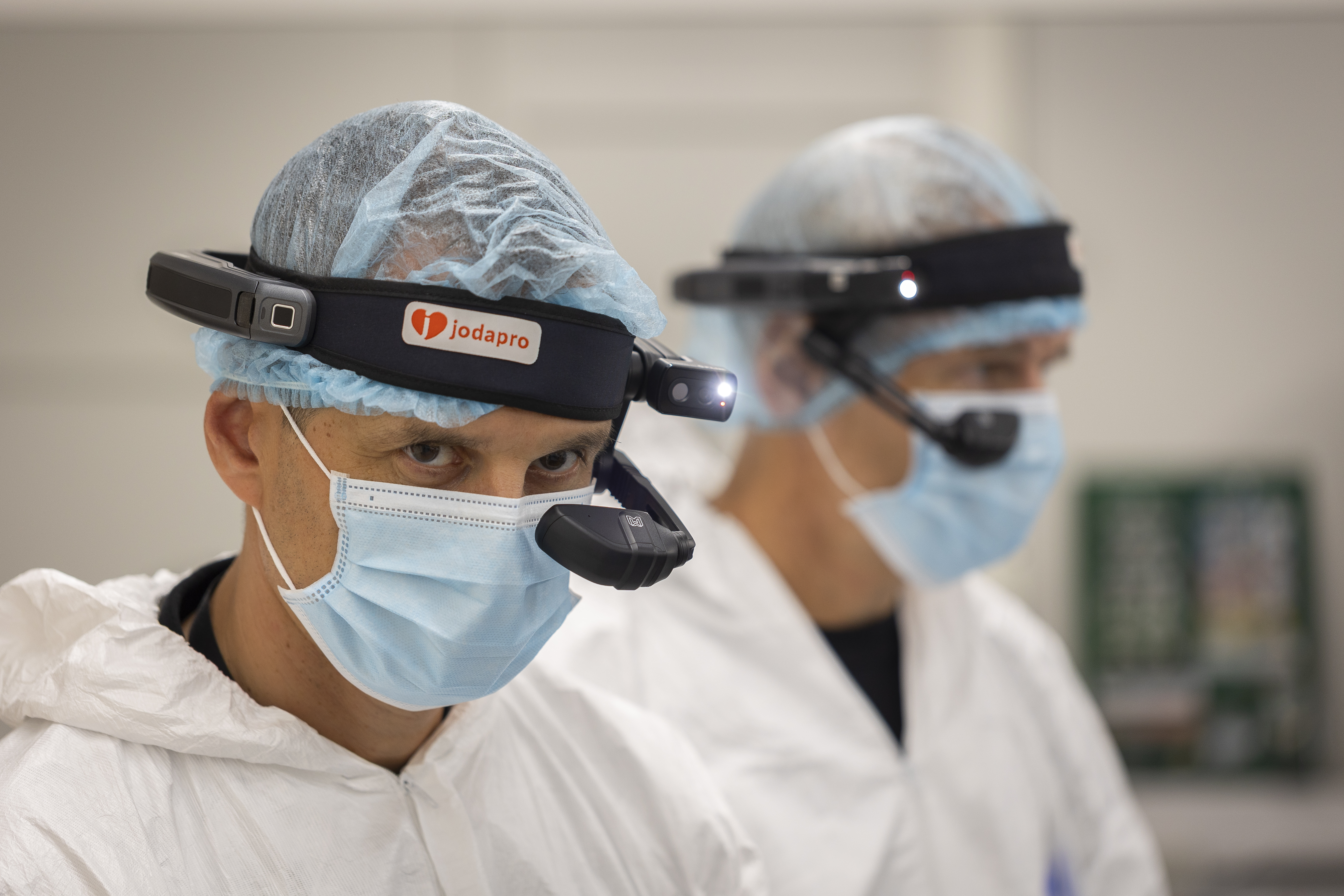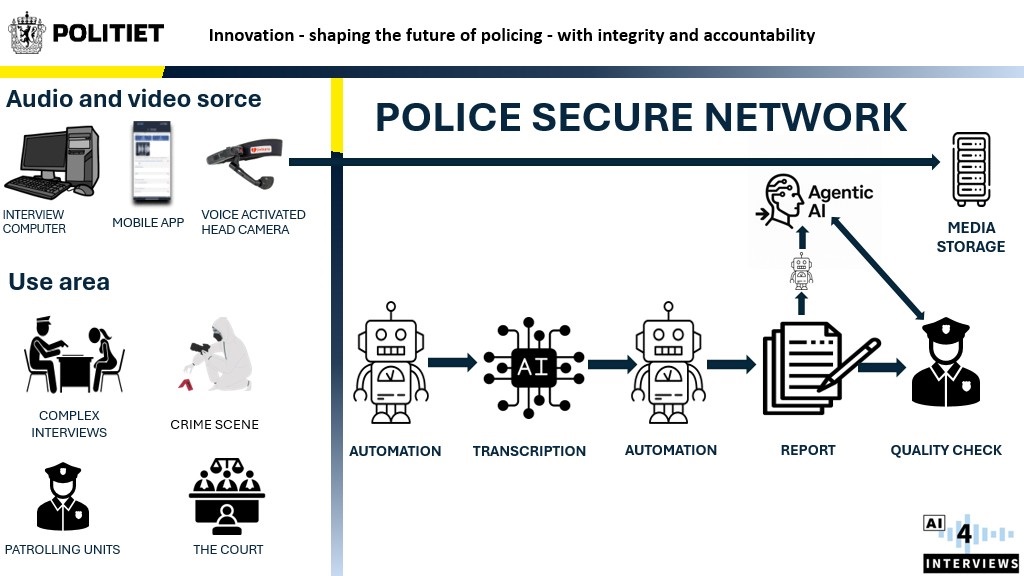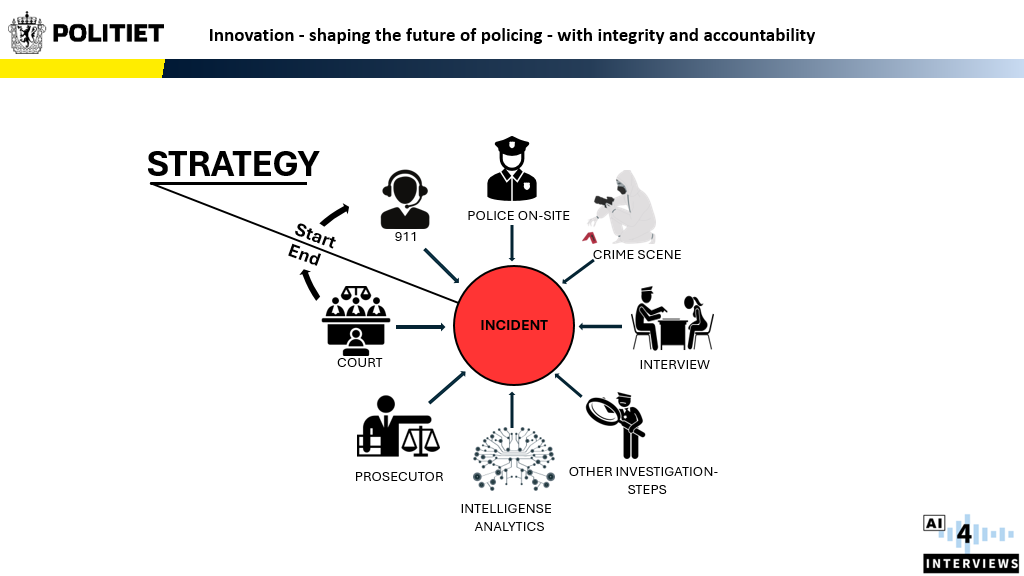AI4Interviews – Innovation in the Police
- Norsk
- English
AI4Interviews is an innovation project within the Norwegian Police exploring how artificial intelligence (AI) can make police work more efficient.
The project focuses on solutions in areas such as interviews, investigations, crime scene examination, reporting, court transcription, and crisis exercises.
Between 2022 and 2025, the project has received funding from the Research Council of Norway. It is a collaboration between the Police, NTNU CCIS, and industry partner Schjønhaug AS.
AI4Interviews has been nominated for several prestigious awards:
- The Digitalisation Award 2025 (Norway)
- Europol’s Excellence Awards in Innovation (Europe)
- The Global Innovation Management Institute Awards (Global)
Below you will find information about the need for efficiency, examples of solutions, the technology areas we work with, and how we approach innovation.
Efficiency Opportunities in the Police
The police have significant opportunities to increase efficiency through modern technology:
- The police conduct more than 150,000 interviews annually, of which around 45,000 take place in the field. Manual transcription and report writing are highly time-consuming.
- A survey shows that crime scene investigators spend more than 50% of their working hours on report writing.
- We speak 8–12 times faster than we write – speech recognition can therefore deliver major benefits.
- Data volumes in the police are growing rapidly. AI and automation can reduce manual documentation work and help analyze large amounts of information.
We believe technology can help to:
- reduce resources spent on manual processes,
- increase precision and legal certainty in police work,
- strengthen police documentation practices,
- and better prepare the police for future challenges.
About the project
Forensic Solutions
Crime scene investigators are testing speech-to-text and voice-controlled head cameras (JodaPro) to document findings directly at the scene. The cameras can also live-stream, enabling experts to provide assistance from anywhere.
We have developed an integrated solution for forensic investigators that supports collaboration across locations. It provides shared situational awareness, more efficient processes, and improved documentation.
Recordings can be transcribed, and the text can be structured into standardized reports using AI. Reports can later be updated both orally and in writing.
PPS – Police Work on the Scene
We are testing an interview app that allows patrol officers to conduct witness interviews in the field. Once the interview is completed, the recording is automatically sent for transcription. The police officer then reviews and verifies the text. The result is faster reports that can be used more quickly in the critical early phase of an investigation.

At AI4Interviews, we build solutions with flexible modules – “building blocks” – that can be replaced or improved as needed. This makes us less vulnerable and more adaptable.
1. JodaPro – smart, voice-controlled head cameras
- Capture audio and video directly from the crime scene, with hands-free operation and real-time collaboration.
- Excellent noise reduction ensures accurate speech-to-text results.
- Thermal camera enables fast and precise temperature measurement in various cases.
2. Automatic Speech Recognition / Speech-to-Text (STT)
- Converts audio recordings into text in minutes instead of hours.
- Handles multiple languages and Norwegian dialects.
- Tested in interviews, court hearings, and crisis exercises.
3. Quality Assurance of Speech-to-Text
- The police have developed Skriber, a flexible tool to improve transcribed text.
- Reduces errors, increases reliability, and can identify “who said what, when.”
4. Automatic Generation of Standard Reports
- AI can structure unstructured dictation from the crime scene or lab into standardized reports.
- Reports can be adjusted both orally and in writing.
- Proof-of-concept results are highly promising.
5. Automation of Audio Recordings
- One or more audio files can be placed in a folder and automatically sent for transcription.
- Results can be automatically compiled into one or more text files.
- The robots can be used together with several of the building blocks and the police’s core systems. Tests show major benefits.

The goal is to achieve faster information flow for a shared situational awareness and to provide better decision-making support during incidents. In addition, it saves time and allows resources to be managed more efficiently.
- We use both stationary and mobile devices.
- The recordings are sent to the police secure network.
- A software robot then retrieves a copy of the file and sends it to an AI-driven transcription service, which converts speech to text.
- Once the transcription is ready, the robot sends a link to the officer with personal access to the transcription.
- The officer who made the recording reviews the transcription for quality and validates it as an official document.
Learning Through Practice
Below are some of the approaches we use:
- Proof of Concept: small-scale trials early on, allowing professionals to test the technology.
- User-Centered Design: realistic scenarios ensure solutions that work in everyday practice.
- Human and Efficiency Factors: both usability and impact are assessed at different stages.
- Adapting External Technology: we draw inspiration from outside but adapt solutions to the needs of the police.
- Holistic Design: balancing technical details and system architecture to deliver both short- and long-term benefits.
- Legal and Ethical Framework: complying with GDPR, the EU AI Act, and the Interpol/UNICRI Toolkit.
- Continuous Improvement: learning and evaluation at every stage.
Innovation is a Team Sport
We see innovation as a team sport. We collaborate nationally and internationally with academia, industry, and the public sector. The goal is to cover the necessary areas of expertise – from policing and data protection to law, ethics, AI, and automation.
Want to know more about the project? Please contact: AI4Interviews@politiet.no

